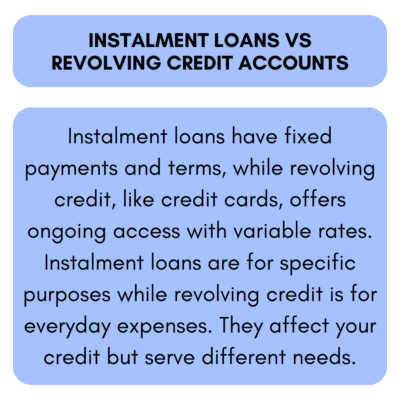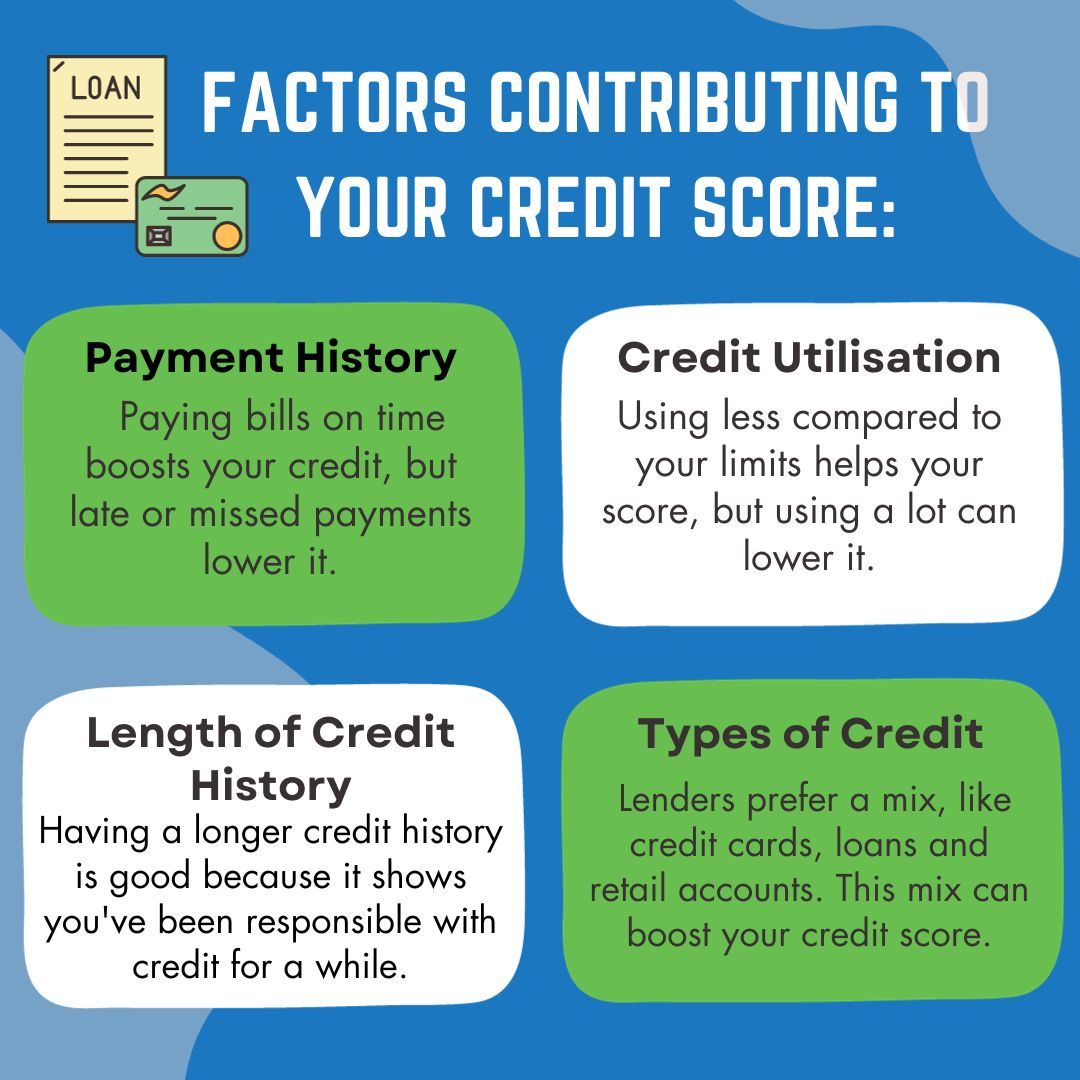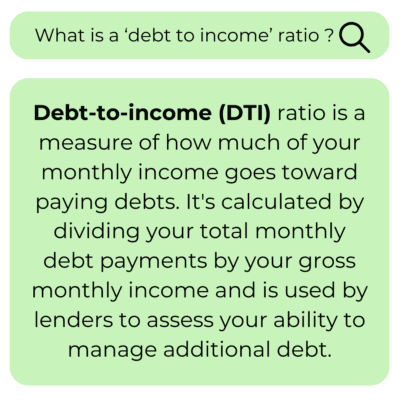The outcome of your personal loan hinges on how well you manage it, and it can affect your credit positively or negatively. Responsible management, like on-time payments, can improve long-term credit, while missed payments or defaults can harm your credit.
A personal loan is money you borrow from a bank or lender for your individual needs, which you pay back in smaller amounts over time, often with interest. Unlike other loans, you don’t need to cough up anything valuable, like a car or house, as collateral to get one. If used wisely, personal loans can improve your credit as long as you are careful not to overspend.
Understanding Credit Scores
A credit score is a number that shows you how reliable you are with money. This score is necessary for lenders to assess the risk of lending you money. In other words, think of your credit score as a financial report card that grades your money management skills. The higher your score, the better!
Here are some things your credit score affects:
- Future Loans: When applying for loans, a higher credit score can open doors to better-borrowing terms and lower interest rates, saving you significant money over time.
- Insurance: Companies may use your credit score to assess the risk of insuring you, affecting your premiums.
- Renting: Landlords often check credit scores to evaluate the likelihood of on-time rent payments, which can influence their decision to rent you a property.
- Job Opportunities: Even in the job market, certain employers may consider your credit history as a measure of financial responsibility, especially for positions that involve handling money or sensitive financial information.
Factors contributing to your credit score
- Payment History: This is the most significant factor. It tracks whether you pay your bills on time. Consistent, on-time payments boost your credit score, while late or missed payments can lower it.
- Credit Utilisation: This measures how much of your available credit you’re using. Keeping your credit card balances low compared to your credit limits can boost your score. High utilisation suggests financial strain and can lower your score.
- Length of Credit History: This looks at how long you’ve had credit accounts. A longer credit history can be favourable, as it shows a track record of responsible credit management.
- Types of Credit: Lenders like to see a mix of credit types, such as credit cards, instalment loans (like mortgages or car loans), and retail accounts. A diverse credit portfolio can positively influence your score.
How to find your credit score
In New Zealand, you can get a free credit report from several agencies. Below are the three main credit reporting agencies:
- Centrix: They possess the most extensive consumer credit database in New Zealand, encompassing credit data for more than 4 million Kiwi consumers, which accounts for 95% of the adult population.
- Equifax: New Zealand’s most comprehensive credit rating company. They can provide you with a complete credit report.
- Illion: They are one of Australia’s leading consumer and commercial credit bureaus (formerly Dun & Bradstreet).
The Initial Impact of Personal Loans
Getting a personal loan can have a big impact on your finances right from the start. Whether you’re using it to pay off debts, improve your home, or handle unexpected expenses, it’s important to know how it will affect your money and credit right after you decide to get one.
Credit Inquiry
When you submit a loan application, the lender typically checks your credit report with a hard inquiry (also known as a hard pull or hard credit check). This inquiry can cause a small, temporary dip in your credit score, usually a few points. Multiple hard inquiries within a short period, such as when you apply for multiple loans simultaneously, can have a more significant negative effect.
New Credit Account
If your loan application is approved, a new credit account is opened in your name. This can initially lower your credit score because it reduces the average age of your credit accounts, which is a factor in your credit score. However, this impact is usually minor and can improve over time as you make on-time payments.
Side note on average age: When you open a new credit account, it starts with an age of zero. Over time, as you continue to use the account responsibly, its age increases. Accounts you’ve had for several years contribute to the average age of your credit score. The longer an account has been open and in good standing, the more it positively influences your credit score.
Debt-to-Income Ratio
If you are approved for the loan and use it to pay off high-interest debt or consolidate multiple debts, it can make your debt situation look better than your income. This can eventually make your credit score better.
The Long-Term Impact of Personal Loans
Taking out a personal loan can also impact your long-term financial situation.
Benefitting from on-time loan payments
If you consistently make on-time payments for your personal loan, it can have several positive long-term effects:
- Credit Score Improvement: Timely payments demonstrate responsible financial behaviour and can gradually increase your credit score.
- Debt Reduction: As you make payments, you reduce the outstanding balance of the loan, which can improve your overall debt-to-credit ratio, another positive factor for your credit score.
- Interest Savings: Making regular payments reduces the total interest you pay over the life of the loan, saving you money.
Facing the consequence of late payments
On the other hand, if you miss payments or make late payments, it can lead to negative long-term consequences:
- Credit Score Decline: Late or missed payments can significantly lower your credit score and make it harder to access credit in the future.
- Late Fees and Penalties: Late payments may result in additional fees and penalties, increasing the overall cost of the loan.
- Collection Actions: Continued failure to make timely payments may result in the loan being referred to collections, potentially causing significant harm to your credit score and overall financial stability.
Debt Management
How you manage the loan in the long term also matters. Using the loan to consolidate high-interest debts and then responsibly manage your finances can help you reduce debt faster and improve your overall financial situation.
Credit Utilisation
Credit utilisation ratio or (balance-to-limit ratio) measures how much of your available credit you’re currently using, expressed as a percentage. Lenders use your credit utilisation ratio to assess how well you’re managing your current debt.
To calculate:
- Add up the total outstanding balances on your credit accounts.
- Add up total credit limits on those same accounts
- Divide your total credit balances by your credit limits.
If you have a $1,000 balance and a $5,000 limit, your ratio is 20%. Keeping this ratio low, ideally below 30% or lower. Generally, a lower ratio is better for your credit score. Lenders and credit scoring models view a high utilisation ratio as a potential sign of financial strain, while a low ratio suggests responsible credit management.
Therefore, managing your credit card balances and credit utilisation wisely is crucial for maintaining a healthy credit profile.
How a personal loan affects your credit utilisation ratio
Personal loans can have direct and indirect effects on your credit utilisation ratio, primarily associated with credit card accounts. Here’s how personal loans can impact your credit utilisation ratio.
Direct Impact
Personal loans themselves do not contribute to your credit utilisation ratio because they are instalment loans, not revolving credit accounts like credit cards or lines of credit. Credit utilisation specifically refers to the percentage of your available revolving credit that you’re using. Since personal loans have fixed terms and fixed monthly payments, they don’t have a credit utilisation ratio associated with them.

Indirect Impact
While personal loans themselves don’t affect your credit utilisation ratio, they can indirectly influence it in a few ways:
- Debt Consolidation: If you use a personal loan to consolidate high-interest credit card debt and pay off those balances, it can reduce your credit card balances to zero. This can significantly lower your credit utilisation ratio, which is a positive outcome for your credit score.
- Credit Card Usage: If you obtain a personal loan and simultaneously continue to use your credit cards for new purchases or carry high balances, your credit utilisation ratio can remain high or even increase. In this case, the personal loan doesn’t directly affect the ratio because it’s not revolving credit, but it doesn’t address the underlying issue of high credit card debt.
- Credit Score Improvement: Successfully managing a personal loan, making on-time payments, and reducing your credit card balances as a result of the loan can improve your overall creditworthiness, leading to potential score improvement over time.
Diversifying Your Credit Mix
Having different kinds of credit, like personal loans or other types of loans, can be good for your credit score. Here’s why:
- Demonstrates Credit Responsibility: Managing a mix of credit types, including revolving credit (like credit cards) and instalment credit (like loans), showcases your ability to handle different financial responsibilities. Also, having a balance between these types can improve your credit mix, making you appear less risky to lenders.
- Longer Credit History: Credit accounts have different lifespans. Credit cards usually stay open indefinitely, while instalment loans have fixed timeframes. The longer you’ve managed both accounts responsibly, the better it is for your credit score, showing you can handle credit well.
- Reduces Dependency on a Single Type: Relying solely on one type of credit can be risky. If, for instance, you only have credit card debt, it can lead to a high credit utilisation ratio, which may negatively impact your credit score. A mix of credit types allows you to balance your credit usage and diversify your risk.
- Predicts Future Behavior: Lenders often use your credit history to predict your future credit behaviour. A diverse credit mix can provide lenders with more information to assess how you might handle new types of credit.
These are all reasons that suggest introducing a personal loan into your credit portfolio can be beneficial as it diversifies your credit mix, especially if you’ve primarily relied on credit cards.
Potential Risks
When considering a personal loan, you must be aware of potential risks that could impact your financial well-being.
- Overborrowing: One significant risk is overborrowing, where you take out a loan for more than you actually need. This can lead to higher debt levels and potentially strain your finances.
- High-Interest Rates: Depending on your creditworthiness and the lender, personal loans can have relatively high-interest rates compared to other forms of credit, like secured loans. This means you may pay a significant amount in interest over the life of the loan.
- Defaulting on Payments: Failing to make timely loan payments can result in default. Defaulting not only damages your credit score but can also lead to legal actions and additional fees.
- Risk of Losing Collateral: If you’ve taken out a secured personal loan, such as a home equity loan, you risk losing the collateral (e.g., your home) if you default on the loan.
- Repayment Challenges: If you experience a change in your financial situation, such as a job loss or unexpected expenses, you may find it challenging to meet your loan obligations.
Taking on a personal loan is a significant financial decision, and it’s crucial that you weigh the potential risks against the benefits. Careful planning and responsible borrowing can help you navigate these risks and use personal loans as a valuable financial tool when needed.
Conclusion
Personal loans can be valuable financial tools when used wisely and responsibly. They offer a means to address immediate financial needs, consolidate high-interest debt, and improve your credit profile. However, it’s crucial to be aware of the potential risks, such as overborrowing and defaulting, and to manage your loans diligently. Your credit score plays a significant role in your financial life, impacting future loans, insurance premiums, rental opportunities, and even job prospects. By understanding how personal loans and credit management affect your financial well-being, you can make informed decisions and work toward achieving your long-term financial goals while maintaining a healthy credit profile.


